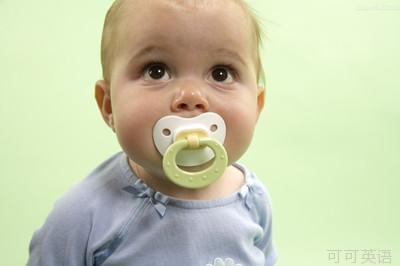The first hours of life can be rough. So for years newborns in the hospital were given pacifiers to calm and quiet them—with many breast-feeding advocates worrying the newborns would get used to the artificial nipple and be less inclined to take to the breast.
生命之初的幾個小時可謂是艱辛的。因此多年來,給醫院里的新生兒喂奶嘴被當作使他們平靜安寧下來的好法子。許多母乳喂養倡導者們擔心新生兒們會因習慣于人造的乳頭而變得不太愿意吃奶。

But never fear. A study finds that keeping kids from getting pacifiers did not help later breast-feeding. In fact, it looks like this hindered the kids eventually becoming exclusively breast-fed.
然而不必擔心。一項研究發現讓嬰兒們遠離奶嘴并不有助于后期的母乳喂養。實際上,這似乎會阻止孩子們完全靠母乳喂養長大。
The study followed more than 2,000 infants born over the course of about a year. When pacifiers were prohibited, surprisingly, fewer babies were breast-fed exclusively while in the hospital and more received supplemental formula. The findings were presented at the Pediatric Academic Societies annual meeting.
這項研究調查了兩千多名嬰兒,在他們出生后一年的時間內持續進行跟蹤。令人驚訝的是,在醫院時禁止使用奶嘴的孩子中,很少有是完全由母乳喂養的,更多的孩子都會輔以奶粉喂養。這項研究在兒科學會年度會議上發布。
The World Health Organization recommends breast-feeding babies exclusively for six months and then partially until age two. So for those early hours, a pacifier might be just what the doctor—or maternity ward nurse—ordered.
世界衛生組織建議嬰兒出生后的六個月內完全靠母乳喂養,六個月后至兩歲前部分靠母乳喂養。那么在最初的時光里,喂嬰兒奶嘴可能只是醫生或者產科病房護士的命令。
來源:可可英語 http://www.ccdyzl.cn/broadcast/201212/213460.shtml











